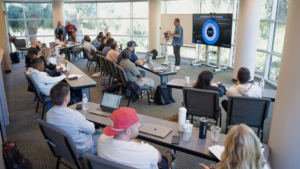Death is certain.
On April 17th, 1790, in Philidelphia, a famous statesman, philosopher, printer, scientist, and abolitionist died at the age of 84. His impact on America lives on today. He invented flippers, the flexible catheter, bifocals, lightning rods, and the first library and hospital in America. He was known for his sayings popularized in the Poor Richard’s Almanac. One of his most famous sayings we find not in his almanac but a letter six months before his death. He wrote, “Our new Constitution is now established, and has an appearance that promises permanency; but in this world, nothing can be said to be certain, except death and taxes.” I think Benjamin Franklin was right: Death is certain.
How do we as pastors and elders and church leaders shepherd through death and dying?
This last winter, I had the privilege to officiate two funerals. They were quite different. One was for a young man who had stage 4 pancreatic cancer. After three years of battling, God took him home. He frequented church and professed faith. The other was my 78-year-old neighbor, Ed. Ed had prostate cancer, usually treatable, yet his cancer spread to his bones and died within a short time. Ed was not religious. He never went to church and did not profess faith. I shared Christ with him a couple of times this year. Days before he died, he confessed to believing the truth about Jesus.
No matter the age, I think death is exhausting and so is saying goodbye. Even if you didn’t know Ed or this young man, it would be hard to have a dry eye spending time with them in their last days. Cancer didn’t discriminate. Death comes to all.
Death is certain.
Ecclesiastes 7:2 states, “It is better to go to the house of mourning than to go to the house of feasting.” Why is that? The verse continues, “for this is the end of all mankind, and the living will lay it to heart.” Death is certain. It is the end of all mankind.
How do we care for the dying? As pastors, elders, and church leaders, we have a passport into the private lives of people, especially at death. Some seek counsel, pursue confession, and want hope from us in moments like those.
What do we say to a person in the emergency room? What kind of ministry do we give the parent who suddenly loses a child? How do we care for a wife who wants to know where her husband is after he passed? How do we navigate a person saying something off base at the funeral? After the tragic loss of most of his family, Job stated, “The Lord gave, and the Lord has taken away” (Job 1:21). He was correct. However, why does He? Why do bad things happen to good people? Loss can present a real crisis of faith. As shepherds, how do we respond? We need wisdom.
Here are 7 reminders:
1. Visit the sick.
Jesus met the sick. We are to care for those in our congregation. Shepherds should smell like sheep. Take a break from sermon prep, programming, bulletins, and emails. Visit the sick. Visiting can be hard with a busy schedule. Take an elder or spouse or staff member with you. Maximize your time. Sit with the dying. Be available. Acts 5:42 states, “And every day, in the temple and from house to house, they did not cease teaching and preaching that the Christ is Jesus.” The early followers of Jesus went from house to house, sharing the good news. If the Apostles made a practice of going from home to home, why not we? Visit the sick.
2. Listen.
James 1:19 says, “Be quick to listen, slow to speak.” Ask open-ended questions like: “How are you doing, really? What are the doctors saying about your health? How can the church help you?”, and “Where are you at in your relationship with God these days?” Take time to be quiet and truly listen.
3. Pray with the suffering.
James 5:13-15 states, “Is anyone among you suffering? Let him pray. Is anyone cheerful? Let him sing praise. Is anyone among you sick? Let him call for the elders of the church, and let them pray over him, anointing him with oil in the name of the Lord.” Whom are you praying with? Don’t go it alone. Grab your leadership team, and pray with the suffering.
4. Share the gospel.
Paul wrote to the Corinthians that the fact that Jesus died for our sins is of utmost importance (1 Corinthians 15:3). He understood that the gospel was primary. Our flock needs to know this. It is a matter of eternal life and death. There are plenty of resources out there on how to share the gospel. Gary Rohmayer, the President of Converge MidAmerica, has spent much of his life discipling and evangelizing those around him. He gave a lecture a while back saying something like, “How can we as pastors ask our people to share their faith and make disciples if we are not doing it ourselves?” I have been encouraged by his example and teaching on exploring the spiritual journey with my neighbors. Gary created a resource to help make sharing our faith a conversation, not a sermon. I like his relational approach. People want care and concern, not a lecture. I know we can’t make people believe, but we can and must share the gospel. Be bold. Share the gospel.
5. Serve.
Once someone has passed away, there are many ways to serve the grieving. A significant way to help is to offer your building if you have one. Don’t let your space sit empty. Recently, the senior pastor of Converge Community Church Jeff Dryden did just that because the family did not think the funeral home down the street was large enough for the service. That was brilliant. It got people in the door who would never have attended on a Sunday or haven’t been to church in a long while. 60% of our population does not affiliate with a Christian congregation. Increasingly, we are living in a secularized society and need to think about how can we be a light in the darkness. Using the building is only one example of how we can serve the suffering. Seize the moment and serve.
6. Lead the funeral or memorial service.
The 9Marks podcast called Pastor’s Talk spoke on the topic of funerals a while back. One take away for me was to open up the service for anyone to share their memories of the loved one. Personally, I enjoy hearing stories of the deceased at services. Memories allow those familiar and unfamiliar the chance to recollect and mourn. I admit an open mic is a bit risky. However, Mark Dever recommended that the pastor concludes the service to be able to bring gospel hope and do clean up. That made sense to me. Lead the service.
7. Follow-up.
Finally, I would encourage following up with those who have lost their loved one. Grief is a process. Continue to care for the families through the difficult days ahead. Ask how they are doing. Encourage the church to continue to care. Check-in, don’t check out. Holidays and birthdays and anniversaries can be agonizing. Everyone moves on except loved ones. No one wants to make the sorrowful feel awkward, uncomfortable, or bring up painful memories. However, sometimes, all the loved one wants is to talk about the deceased and remember. Don’t be afraid to follow-up. Mark events on your calendar and follow-up.
How are you preparing people for the certainties ahead?
Death is certain.
I hope you can see that it is better to go to a house of mourning than feasting. May God help you as you care for souls facing their mortality.



